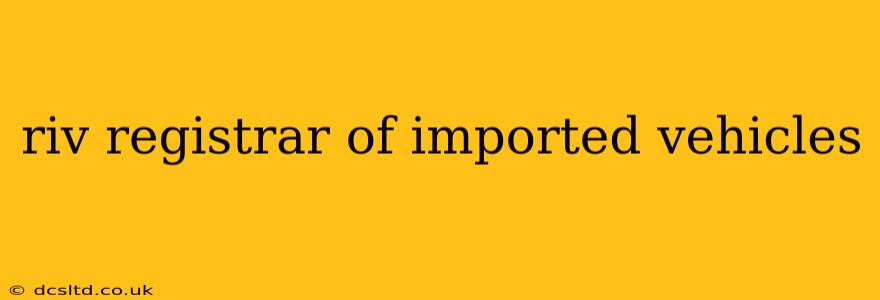The Registrar of Imported Vehicles (RIV) plays a crucial role in the process of registering imported vehicles in many countries. Understanding its functions and procedures is vital for anyone importing a car, motorcycle, or other vehicle. This guide will delve into the intricacies of the RIV, addressing common questions and concerns.
What is the RIV and What Does it Do?
The RIV, or a similar entity with a comparable function, acts as the central authority responsible for verifying the legitimacy and compliance of imported vehicles. Its primary functions often include:
- Vehicle Inspection: Thorough inspections are conducted to ensure the vehicle meets the importing country's safety, emission, and environmental standards. This often involves checking for modifications, verifying the VIN (Vehicle Identification Number), and ensuring the vehicle's documentation is accurate and authentic.
- Documentation Verification: The RIV confirms the authenticity and validity of all relevant import documents, such as the bill of sale, certificate of origin, and any required customs paperwork. They ensure everything aligns and conforms to regulations.
- Duty and Tax Assessment: While not directly involved in the collection, the RIV's inspection helps determine the applicable import duties and taxes based on the vehicle's assessed value and characteristics.
- Issuing Registration: Once all inspections and verifications are complete, and applicable fees are paid, the RIV (or the associated registration authority) will issue the necessary registration documents, allowing the vehicle to be legally operated within the country.
The specific procedures and requirements can vary significantly depending on the country. It's crucial to contact the relevant authority in your target country for detailed information.
What Documents Do I Need to Register an Imported Vehicle?
The required documents often include, but are not limited to:
- Bill of Sale: Proof of purchase from the seller.
- Certificate of Origin: Verifies the vehicle's country of manufacture.
- Import Permit (if required): Some countries require an import permit before the vehicle can even be shipped.
- Proof of Insurance: Insurance is generally mandatory before registration.
- Valid Passport or ID: For identification purposes.
- Proof of Address: To confirm your residency.
- Vehicle's Title or Ownership Documents: Demonstrates ownership and legal possession.
Remember, this list is not exhaustive. Always consult the specific requirements of the relevant RIV or registration authority in your region. Incomplete or inaccurate documentation will significantly delay the process.
How Long Does the RIV Registration Process Take?
The time it takes to register an imported vehicle through the RIV varies greatly depending on several factors:
- Volume of Applications: High application volumes can lead to processing delays.
- Completeness of Documentation: Missing or incomplete documents will significantly delay the process.
- Vehicle Inspection Results: Any issues identified during the inspection will require rectification before registration can be granted.
- Specific Country Regulations: Regulations differ across countries and influence the processing time.
It's prudent to allow ample time for the entire process, and proactive communication with the RIV will help manage expectations.
What Happens if My Vehicle Fails the RIV Inspection?
If your vehicle fails the inspection, you will be informed of the necessary repairs or modifications required to meet the regulatory standards. Failing an inspection can result in substantial delays as you must address the identified issues before resubmitting for inspection. This could involve costly repairs or modifications, depending on the severity of the issues. Understanding the inspection criteria beforehand helps prevent unexpected issues.
What are the Fees Associated with RIV Registration?
The fees associated with RIV registration vary greatly and depend on several factors, including:
- Type of Vehicle: Cars, motorcycles, and other vehicles have different fee structures.
- Vehicle Value: Higher-value vehicles usually attract higher registration fees.
- Country-Specific Regulations: Fees are determined by each country’s specific regulatory framework.
It's essential to obtain a detailed fee schedule from the relevant RIV or registration authority before proceeding with the import process.
Where Can I Find More Information About the RIV?
To obtain the most accurate and up-to-date information about the RIV process and associated requirements, you should always consult the official website of the relevant authority in your specific country or region. This will provide the most reliable information on procedures, fees, and required documentation.
This comprehensive guide provides a general overview of the RIV and the process of registering imported vehicles. However, the specifics will vary significantly by location. Always check with the appropriate authorities in your country for the most accurate and up-to-date information.
